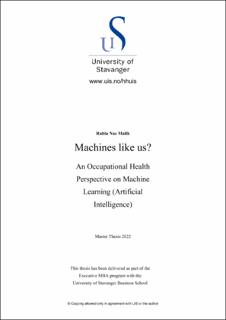| dc.description.abstract | Summary
Aim
Focusing on management theories and occupational health and safety (OSH) principles, the use of machine learning (AI) may give benefits within risk management, economical costs, as well as prevent sickness absence and work-related illness. The purpose of this thesis was to develop an industry standard in the form of concrete advice for management and OSH services on how to avoid sickness absence related to the introduction and application of machine learning (AI).
Method
This thesis is a literature-based monography set in the Norwegian work-life context. An explorative, qualitative research design was chosen with a phenomenological approach. Three main theoretical perspectives were explored, namely the psychological, sociological and cognitive perspectives. In addition, a literature review was performed, and white spots on the theoretical map were defined. This set the theoretical framework for the empirical part of the study, consisting of two focus group interviews from two of Norway’s largest companies. Both companies were data driven and front runners in their fields and were chosen from a vendor (Kongsberg) and buyer (Equinor) perspective. This data was then triangulated against an in-depth interview from SINTEF, one of Europe’s largest research institutes. For external validity, thick description was added.
Limitations may be the sample size in data collection and bias due to the companies chosen. Additionally, there may be researcher’s bias as a company doctor and leading advisor of a multi-disciplinary occupational health team for one of the companies interviewed. Contributions to state-of-the-art To the researcher’s knowledge, this may be the first study of its kind where international OSH advice and research findings from review articles (and a workshop summary) is combined with experience transfer from managers and employees in this phase of machine learning (AI).
Findings show that to prevent machine learning (AI) related sickness absence, the decision makers will need to acquire related OSH competence, perform dynamic virtual task analyses and from the outset integrate OSH measures in early phase developments of machine learning (AI) by utilizing human centered design. The OSH services will need to work more cross-disciplinary again, develop one common language based on Human Factors and perform dynamic evaluations of occupational health risk. The tripartite dialogue with the safety delegates will need to be strengthened with the same competence. | |
